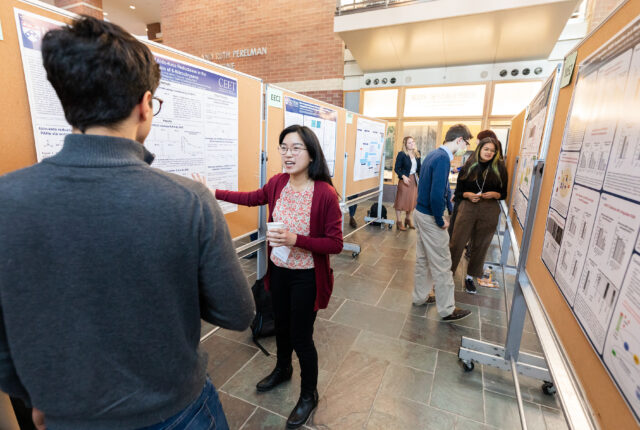Experimental Genome Science: GCB 5340 (1 c.u.); Cell Biology: BIOM 6000 (1 c.u.); Required Course, Lab Rotation or Electives* (2 c.u.)
Graduate Students
CEET’s Certificate Program in Environmental Health Sciences offers a unique curriculum designed to provide training to span the disciplines of translational environmental health sciences. All matriculating students accepted into Biomedical Graduate Studies (BGS) are eligible for acceptance into the certificate program. Students who complete one year of the Certificate Program and elect to conduct thesis research in environmental health sciences, are eligible for additional support from our NIEHS-funded T32 training grant.
Environmental Health Sciences Certificate Program
The Certificate Program focuses on the mechanistic links that exist between environmental exposures, the molecular and cellular effects that ensue, and diseases of environmental etiology. Emphasis is placed on training in genome science, molecular toxicology, environmental epidemiology, data science, and population-based and clinical/translational research. Students are required to perform a community-based rotation. Students engage with world-renowned experts spanning our four thematic areas: Air Pollution & Lung Health, Environmental Exposures and Cancer, Windows-of-Susceptibility, and Environmental Neuroscience.

Environmental Health Sciences Certificate
The certificate training prepares students for careers in toxicology, risk-assessment, and environmental and occupational health sciences and may place in academia, pharmaceutical industry, consumer-product industry, or governmental agencies (e.g., EPA, CDC, FDA, HEI, NIH, including NIEHS, NHLBI, NCI and NIOSH). Trainees receive broad training in these areas for careers in environmental health sciences and will be encouraged to become board certified as “Diplomats of the American Board of Toxicology”.
Eligibility & Application Procedures
• Students enrolled/enrolling in BGS doctoral programs are eligible to apply—and expected to complete the certificate program and doctoral program requirements concurrently.
• Students can apply for admission at the time of their initial application or upon matriculation.
• Please use this link for more details: BGS Application Process
Curriculum
• Required courses take the place of BGS Graduate Group electives.
• Sequence and timing of courses are tailored to the individual and their respective graduate group requirements.
• Students complete three research rotations, including a mandatory Community Environmental Health Rotation— which provides exposure to community groups, regulators and legislators and a mentored opportunity to create translational materials relevant to their area of research.
• Students attend monthly CEET Seminars, monthly Research Progress Talks and the annual CEET Symposium.
• Upon completion of their thesis, trainees receive the Certificate in Environmental Health Sciences and a PhD from their graduate group
First Year
Molecular Toxicology: PHRM 5900 (1 c.u.) Foundations in Statistics: BIOM 6100 (1 c.u.) Required Course, Lab Rotation or Electives* (2 c.u.)
Community-based Rotation Laboratory Rotation
Second Year
Environmental Epidemiology: EPID 7110 (1 c.u.); Data Science for Biomedical Informatics: BMIN 5030 (1 c.u.); Required Courses, Electives or Pre-thesis Research (2 c.u.)
Electives or Pre-Thesis Research (2 c.u.) Thesis Proposal Candidacy Examination (2 c.u.)
Enter Thesis Laboratory
Third-Fifth Year
Translational Research Training Program in Environmental Health Sciences
The CEET training grant, directed by Drs. Trevor Penning and Rebecca Simmons, is the only dedicated mechanism to support formalized Environmental Health Science research training at the pre- and postdoctoral level at Penn.
Learn More
Recent Graduates
Jesssica Murray, PhD
Current Position: Principal Investigator, US Environmental Protection Agency

Isabelle Lee, PhD
Current Position: Senior Scientist, The Research Institute for Fragrance Materials (RIFM)

Nicole Robles-Matos, PhD
Current Position: Toxicologist, US Environmental Protection Agency

Lisa Bottalico, PhD
Current Position: Human Health Risk Assessor, US Environmental Protection Agency
